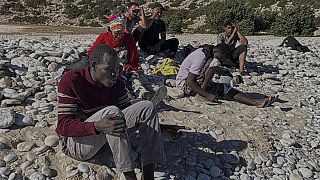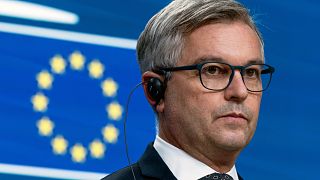Libya
A no fly zone embargo has been imposed over the Libyan capital Tripoli’s airspace. On Wednesday a spokesman for the Libyan National Army revealed the move in a televised speech.
Ahmed al-Mosmari, said the current no-fly zone would be expanded to include the city’s Mitiga airport, which has operated sporadically in recent months due to strikes.
Brigadier General Ahmed al-Mosmari, spokesman of the Libyan National Army (LNA) said: “The General Command of the Libyan Arab Armed Forces announces the expansion of the previously announced air embargo zone to include the Mitiga (international) airport and military air base, as of the hour of this statement announcement at 5 pm, Wednesday, January 8, 2020.
“So, air transport companies must observe this and fully and immediately adhere to the text of this announcement and not expose their aircrafts to the risk of destruction.”
The announcement came as General Khalifa Hiftar’s eastern-based forces launched a fresh offensive against Prime Minister Fayez Sarraj’s UN-backed government in Tripoli.
On Monday, the LNA said they captured the strategic coastal city of Sirte after an operation lasting for approximately three hours.
Libya is currently governed by feuding authorities, with the LNA in the east, and the UN-backed Government of National Accord (GNA) in Tripoli in the west, with each relying on different militias.
Libya’s east-based forces shoot down suggestion of a truce
A spokesman for one of Libya’s rival factions has said its forces will keep fighting for the country’s capital after Russia and Turkey called for a ceasefire yesterday.
Spokesman for the self-styled Libyan Arab Armed Forces Ahmed al-Mosmari said in a video statement late Thursday that group’s battalions will still try to take control of country’s capital Tripoli from ‘terrorist groups.’
The armed forces, led by ex-general Khalifa Hiftar, have been waging an offensive to try to take the city for months. Russia has helped them with expertise and mercenary fighters.
Both Russia and Turkey have been accused of exacerbating the conflict by giving military aid to its parties. Most recently, the Turkish parliament approved last week the deployment of troops to fight on behalf of the United-Nations supported government in Tripoli.
The U.N.-backed government, led by Prime Minister Fayez Sarraj, meanwhile, welcomed the proposed ceasefire. It released a statement late Wednesday expressing its full support for “the resumption of the political process and the elimination of the specter of war.”
Libya is currently governed by dueling authorities in the east and in the west. The east-based government is backed by the self-named Libyan Arab Armed Forces, commanded by Hiftar.
It is supported by the United Arab Emirates and Egypt, as well as France and Russia. The western, Tripoli-based government receives aid from Turkey, Qatar and Italy. Both sides are bolstered by militias which draw from the country’s tribal factions.
Turkish President Recep Tayep Erdogan and his Russian counterpart Vladimir Putin released a joint statement after a meeting in Istanbul calling for a Jan. 12 truce. They did not specify what the conditions would be.
Clashes have continued between the two sides this week. Fawzy Onis, a health ministry spokesman with the Tripoli-based government, said artillery shelling by Hifter’s forces killed two paramedics on Thursday near the coastal city of Sirte. Hifter’s forces recently seized the town.
Observes say the Turkish-Russian suggestion to stop the fighting was unlikely to gain traction with the forces fighting for the country’s eastern government, because it would mean having to sacrifice recent advances they’ve made towards Tripoli. But the meeting between the two powers could show an intent to not worsen the violence.
“If Turkey can assure that some military aid helping Hifter is withdrawn, there is no longer a need for Turkey to deploy massively,” said Claudia Gazzini, a senior analyst with the International Crisis Group in Rome.
The calls for a stop to the fighting came amid a flurry of diplomatic activity by European powers. After a meeting with the Algerian President Abdelmadjid Tebboune on Thursday, Italy’s Foreign Minister Luigi Di Maio wrote on his Facebook page that the E.U. must “work together with the countries neighboring Libya to find a solution to the present crisis, which at the moment sees in the cease-fire our principal aim.”
The Turkish decision to send reinforcements to Tripoli has elicited condemnation from European governments including Italy, Sarraj’s main European backer.
According to the U.N., more than 200 civilians have been killed and more than 128,000 people have fled their homes since the conflict escalated in early April of last year amid Hifter’s push towards the capital. The fighting has threatened to plunge Libya into violent chaos rivaling the 2011 conflict that ousted and killed longtime dictator Moammar Gadhafi.
AGENCIES













Go to video
Greece cracks down on irregular migration, says it’s "not an open corridor to Europe"
02:35
Central African Republic's major rebel groups to disarm, dissolve
Go to video
Families grapple with life in the wake of the Israel-Iran Conflict
01:50
UN urges renewed political and climate action in Libya amid humanitarian and governance crises
00:58
Israel-Iran ceasefire appears to hold amid tensions and diplomatic juggling
01:11
Ukraine-Russia agree to new prisoner swap but talks fail to yield ceasefire